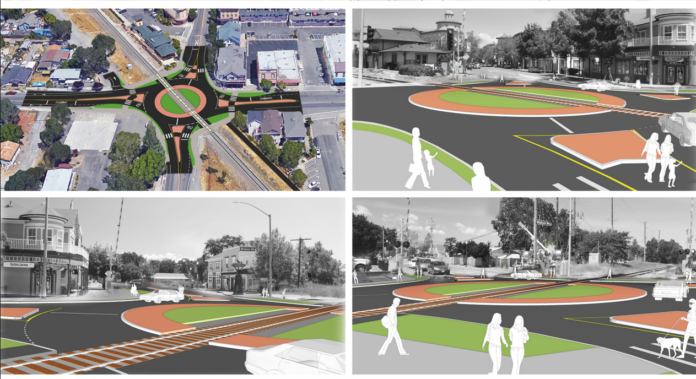A yearlong project to install a roundabout at the intersection of Windsor River Road and Windsor Road entered its first stage Aug. 23.
By replacing the intersection and stoplights with a roundabout, the Windsor River Road/Windsor Road Intersection Improvement Project will improve safety and efficiency, according to the Town of Windsor webpage dedicated to the project.
Stage One of the project will begin with the closure of both roads to vehicles south of Marshall Way. Pedestrian access will be unaffected through the completion of Stage One, which will continue through October, with construction taking place from 7:30 a.m. to 5:30 p.m. Monday through Friday, excluding holidays.
Residents are advised to expect some noise, dust and impacts on traffic patterns and on-street parking, in addition to delays. Access to motorists will be closed off on Windsor Road between Marshall Way and Windsor River Road, and at Wild Oak Drive and Windsor River Road. Temporary pedestrian crosswalks will be installed just north of Marshall Way on Windsor Road and on either side of the intersection on Windsor River Road, with motorists detoured along McClelland Drive and Market Street.
The roundabout project is underway ahead of a future Sonoma Marin Rail Transit (SMART) transit station in the area, after the California Public Utilities Commission (CPUC) identified necessary safety improvements. Goals to be accomplished with the intersection’s redesign are improving traffic circulation, providing for pedestrian and bicycle safety and connecting to a multi-use path along the SMART corridor.
The town has been coordinating with SMART throughout the development of the project.
Following multiple town meetings in 2018 and 2019, including at the planning commission and town council, town officials selected the roundabout model over a renovated 4-way intersection with new traffic signals, railroad gates and pedestrian safety improvements.
According to Windsor Senior Civil Engineer Alejandro Perez, the roundabout option was selected because it will ultimately cause less interruption to traffic.
“I think that the roundabout will function better for vehicles and pedestrians because vehicles will not really need to stop. The intent is to keep traffic moving. Even though you’re going to be moving a little slower, you don’t have to wait for the light to change,” Perez said.
In February 2019, the town council determined that the roundabout design would also be safer for motorists, pedestrians and cyclists alike. An analysis included in a council presentation showed an overall 37% reduction in crashes following conversion from four-way intersections to roundabouts.
Perez also said the $6.2 million project was funded almost entirely by grants, with $3 million coming from federal funding and another $2.8 million from state SB1 gas tax funds. Lytton Rancheria provided an additional $700,000 private grant.
SMART has faced delays in extending its service area into Windsor and beyond, with the SMART website stating that approximately 30% of the work had been completed as of September 2020.
Rhea Borja, senior management analyst and public information officer for Windsor, said that despite delays on SMART’s end, the town is going forward with renovations to prepare for SMART’s arrival — and provide other benefits to downtown travelers.
“There’s been a series of hiccups regarding the SMART train, but we’re doing our part in building our roundabout which will allow for the SMART train to come in in the future,” Borja said. “Also, for safety — not just for drivers but for pedestrians and cyclists. It will also help reduce noise pollution.”









